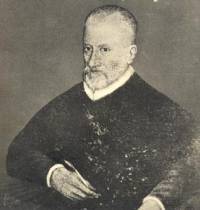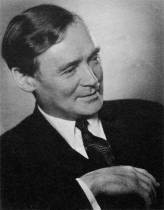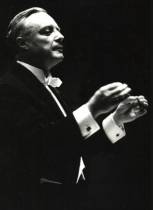
Giovanni Pierluigi da Palestrina (3 February 1525 or 2 February 1526 – 2 February 1594) was an Italian Renaissance composer of sacred music and the best-known 16th-century representative of the Roman School of musical composition. He had a lasting influence on the development of church music, and his work has often been seen as the culmination of Renaissance polyphony. Palestrina was born in the town of Palestrina, which is near Rome, then part of the Papal States. Documents suggest that he first visited Rome in 1537, when he is listed as a chorister at the Sta Maria Maggiore basilica. He studied with Robin Mallapert and Firmin Lebel. He spent most of his career in the city. Palestrina came of age as a musician under the influence of the northern European style of polyphony, which owed its dominance in Italy primarily to two influential Franco-Flemish composers, Guillaume Dufay and Josquin des Prez, who had spent significant portions of their careers there. Italy itself had yet to produce anyone of comparable fame or skill in polyphony. From 1544 to 1551, Palestrina was organist of the principal church (St. Agapito) of his native city, and in 1551 he became maestro di cappella at the Cappella Giulia, the papal choir at St Peter's. His first published compositions, a book of Masses, had made so favorable an impression with Pope Julius III (previously the Bishop of Palestrina) that he appointed Palestrina musical director of the Julian Chapel. This was the first book of Masses by a native composer: in the Italian states of his day, most composers of sacred music were from the Low Countries, France, Portugal, or Spain. In fact the book was modeled on one by Cristóbal de Morales: the woodcut in the front is almost an exact copy of the one from the book by the Spanish composer. During the next decade, Palestrina held positions similar to his Julian Chapel appointment at other chapels and churches in Rome, notably St John Lateran, (1555–1560 - a post previously held by Lassus) and Sta Maria Maggiore (1561–1566). In 1571 he returned to the Julian Chapel and remained at St Peter's for the rest of his life. The decade of the 1570s was difficult for him personally: he lost his brother, two of his sons, and his wife in three separate outbreaks of the plague (1572, 1575, and 1580, respectively). He seems to have considered becoming a priest at this time, but instead he remarried, this time to a wealthy widow. This finally gave him financial independence (he was not well paid as choirmaster) and he was able to compose prolifically until his death. He died in Rome of pleurisy in 1594. In keeping with the custom of that time, Palestrina was buried on the same day he died, in a plain coffin with a lead plate on which was inscribed Libera me Domine. A five-part psalm for three choirs, was sung at the funeral.

Ferdinand Grossmann
Missa "Assumpta est Maria" Missa "Papae Marcelli" Pro Musica Choir, Vienna 1956 
Felix de Nobel
Missa ad fugam Missa brevis 17.02.1955 Missa "Papae Marcelli" 3.07.1952 Netherlands Chamber Choir | 
